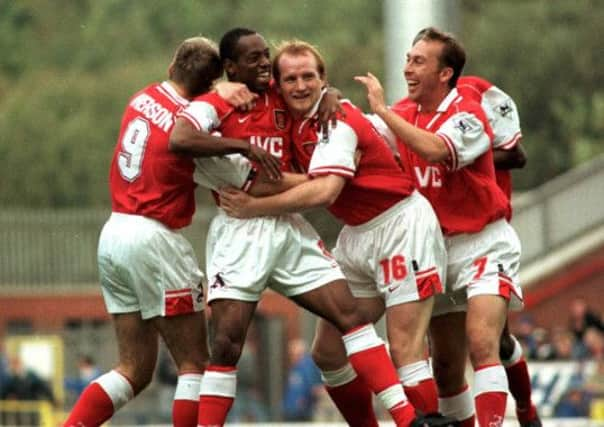When French master took over a dressing room stuck on Mars


It was at Blackburn’s Ewood Park with an Ian Wright double drawing the Gunners level with Liverpool at the top of the Premier League and providing food for thought for away fans.
Ahead of the game, little was known of the bespectacled Frenchman with the headlines saying it all.
Advertisement
Hide AdAdvertisement
Hide Ad“Arsene who?”, with Wenger then a household name only in his own household and foreign managers were viewed with suspicion.
But after reaching, rather than celebrating, his 1,000th match in charge on Saturday, the Frenchman is unknown only to those who know nothing about football and despite his difficult weekend, the respect he is held in the football world hasn’t wavered.
Eighteen years ago, after Arsenal had dispensed with the services of then manager Bruce Rioch, there was widespread scepticism concerning his successor.
Wenger had spent the previous 18 months in Japan, having been sacked by Monaco where he had coloured his CV with two European Cup semi-final appearances and a French league title.
Advertisement
Hide AdAdvertisement
Hide Ad“You needed to be a little bit crazy to do what Arsenal did,” he has since admitted.
However, it is thanks to Arsenal and Wenger that such risks are now commonplace as clubs increasingly go down the overseas route in a desperate attempt to find someone like him.
Wenger’s first impact at the old Highbury was to transform Arsenal’s style of play and he also introduced what is now standard fuel for a footballer – fish, pasta, mineral water, etc – in what became known as the “Evian-broccoli” diet.
Hitherto, chocolate bars were still consumed with gusto by the players, who even chanted “We want our Mars bars back” on the team coach during the formative days of Wenger’s reign.
Advertisement
Hide AdAdvertisement
Hide AdHis impact was swift and spectacular, with Arsenal achieving the Premier League and FA Cup double in Wenger’s first full season in 1997-98 and going on to repeat the feat in 2001-02.
In 2003-04, they won the Premier League without losing a game, the so-called “Invincibles” going on to establish a record 49-match unbeaten run.
The Champions League has eluded him – the closest he came was in 2006 when his team lost 2-1 to Barcelona in the final – and he has not won a trophy since 2005, a fact of which he was tactfully reminded earlier this season by Jose Mourinho, who branded him “a specialist in failure”.
Uncertainty surrounds his future but there is the prospect of another FA Cup final if his team can beat Wigan in the last four.
Advertisement
Hide AdAdvertisement
Hide AdNine years is a long time without a trophy for a club of Arsenal’s stature, but Wenger can look back with pride on a remarkable career.
A thousand games in charge of one club is a phenomenal achievement, particularly in the modern era where chairmen hire and fire like some manic version of Sir Alan Sugar.
If he never wins another slab of silverware, Wenger will still go down as one of the best and most influential managers the English game has seen.
That makes him a specialist in success.